Analyzing the Implications of Eastward Enlargement for New Members
VerifiedAdded on 2023/01/16
|14
|4153
|66
Essay
AI Summary
This essay meticulously examines the implications of the European Union's eastward enlargement, focusing on its multifaceted impacts on both new member states and the broader EU. The analysis begins with an overview of the enlargement process, highlighting the significant increase in member countries since the establishment of the European Economic Community. It then delves into the positive consequences, such as increased trade dynamics, improved economic conditions, promotion of democracy, decline in unemployment, and enhancement of foreign policy. The essay also addresses the negative implications, including increased inflation and the rise of credit booms and financial crises. The essay provides insights into the complexities of EU enlargement, offering a balanced perspective on the challenges and opportunities that have emerged.
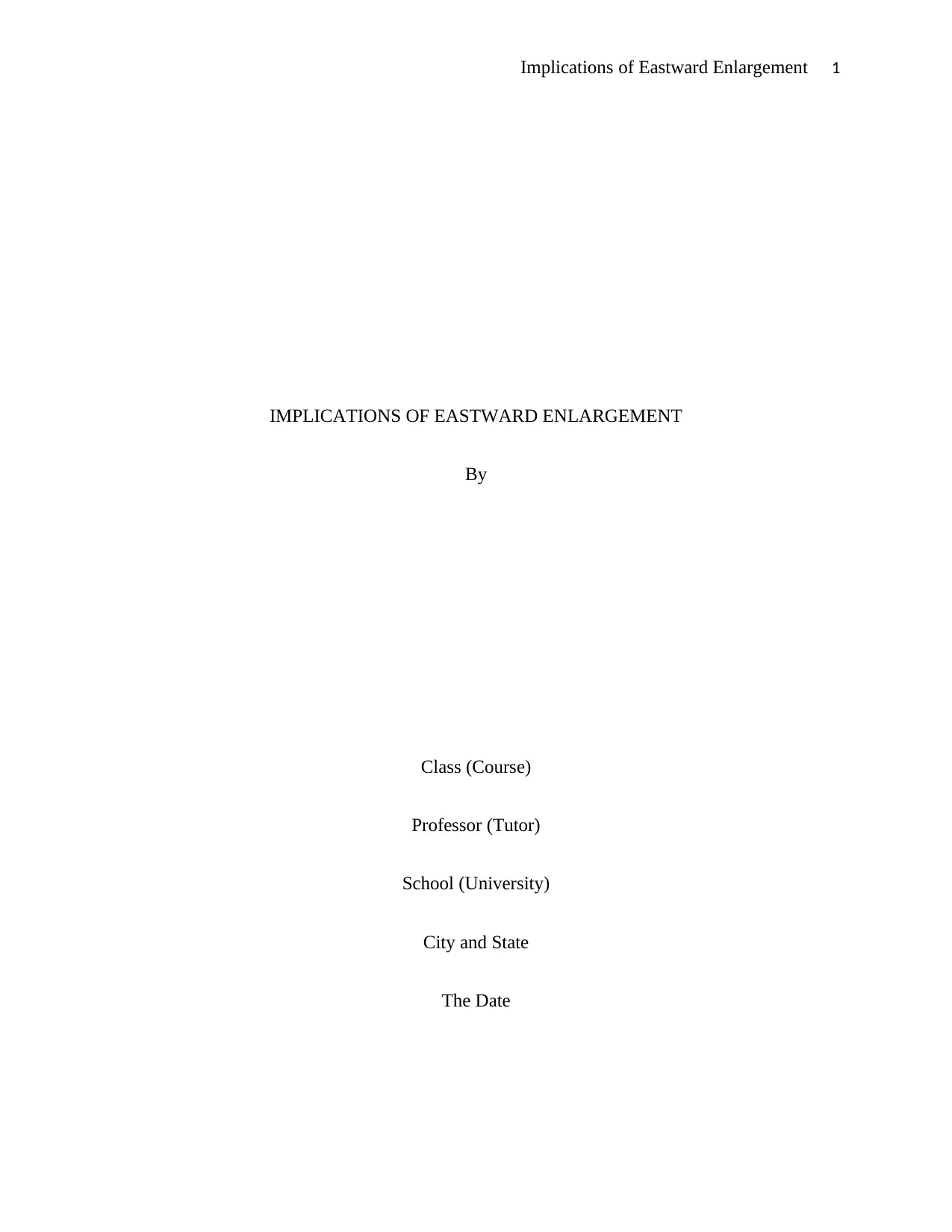
Implications of Eastward Enlargement 1
IMPLICATIONS OF EASTWARD ENLARGEMENT
By
Class (Course)
Professor (Tutor)
School (University)
City and State
The Date
IMPLICATIONS OF EASTWARD ENLARGEMENT
By
Class (Course)
Professor (Tutor)
School (University)
City and State
The Date
Paraphrase This Document
Need a fresh take? Get an instant paraphrase of this document with our AI Paraphraser
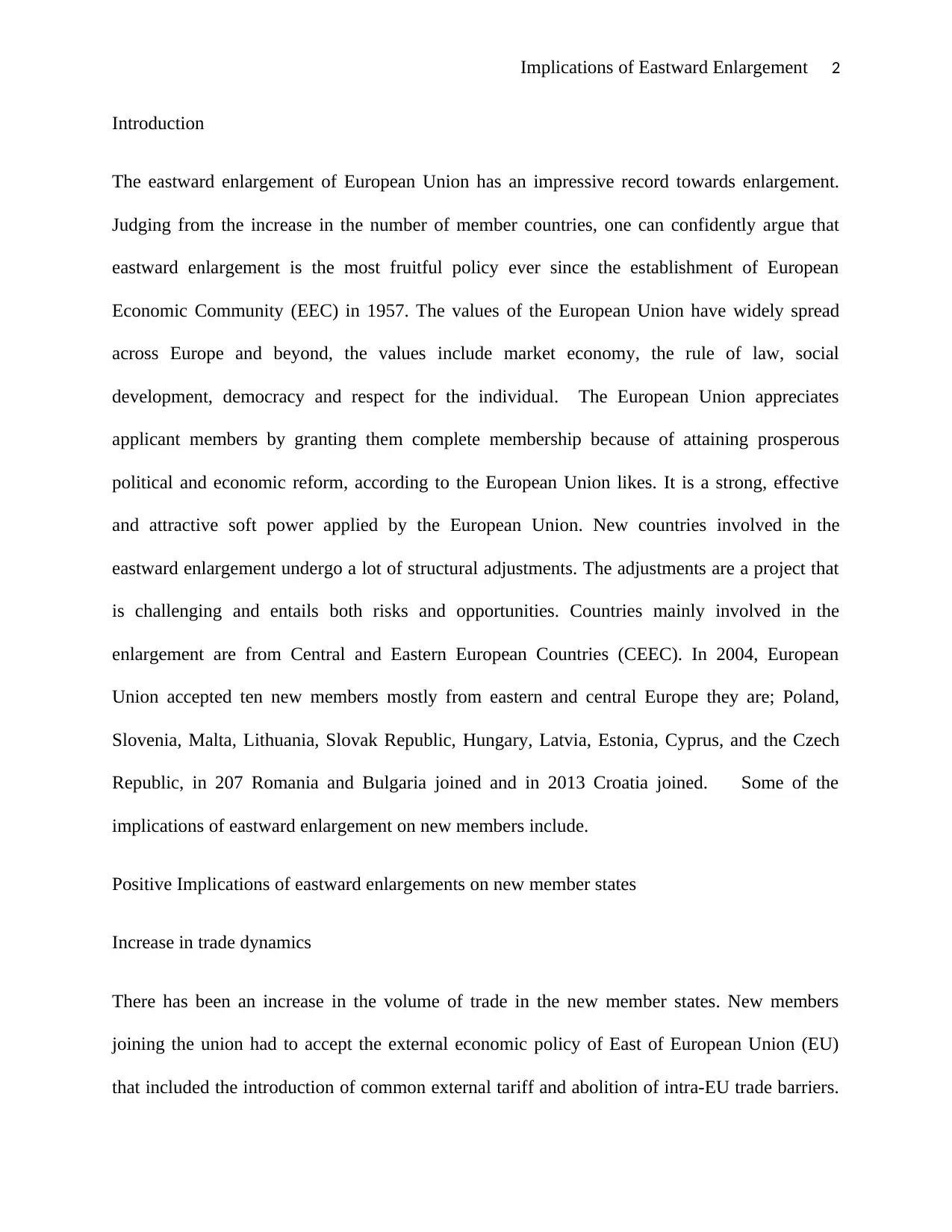
Implications of Eastward Enlargement 2
Introduction
The eastward enlargement of European Union has an impressive record towards enlargement.
Judging from the increase in the number of member countries, one can confidently argue that
eastward enlargement is the most fruitful policy ever since the establishment of European
Economic Community (EEC) in 1957. The values of the European Union have widely spread
across Europe and beyond, the values include market economy, the rule of law, social
development, democracy and respect for the individual. The European Union appreciates
applicant members by granting them complete membership because of attaining prosperous
political and economic reform, according to the European Union likes. It is a strong, effective
and attractive soft power applied by the European Union. New countries involved in the
eastward enlargement undergo a lot of structural adjustments. The adjustments are a project that
is challenging and entails both risks and opportunities. Countries mainly involved in the
enlargement are from Central and Eastern European Countries (CEEC). In 2004, European
Union accepted ten new members mostly from eastern and central Europe they are; Poland,
Slovenia, Malta, Lithuania, Slovak Republic, Hungary, Latvia, Estonia, Cyprus, and the Czech
Republic, in 207 Romania and Bulgaria joined and in 2013 Croatia joined. Some of the
implications of eastward enlargement on new members include.
Positive Implications of eastward enlargements on new member states
Increase in trade dynamics
There has been an increase in the volume of trade in the new member states. New members
joining the union had to accept the external economic policy of East of European Union (EU)
that included the introduction of common external tariff and abolition of intra-EU trade barriers.
Introduction
The eastward enlargement of European Union has an impressive record towards enlargement.
Judging from the increase in the number of member countries, one can confidently argue that
eastward enlargement is the most fruitful policy ever since the establishment of European
Economic Community (EEC) in 1957. The values of the European Union have widely spread
across Europe and beyond, the values include market economy, the rule of law, social
development, democracy and respect for the individual. The European Union appreciates
applicant members by granting them complete membership because of attaining prosperous
political and economic reform, according to the European Union likes. It is a strong, effective
and attractive soft power applied by the European Union. New countries involved in the
eastward enlargement undergo a lot of structural adjustments. The adjustments are a project that
is challenging and entails both risks and opportunities. Countries mainly involved in the
enlargement are from Central and Eastern European Countries (CEEC). In 2004, European
Union accepted ten new members mostly from eastern and central Europe they are; Poland,
Slovenia, Malta, Lithuania, Slovak Republic, Hungary, Latvia, Estonia, Cyprus, and the Czech
Republic, in 207 Romania and Bulgaria joined and in 2013 Croatia joined. Some of the
implications of eastward enlargement on new members include.
Positive Implications of eastward enlargements on new member states
Increase in trade dynamics
There has been an increase in the volume of trade in the new member states. New members
joining the union had to accept the external economic policy of East of European Union (EU)
that included the introduction of common external tariff and abolition of intra-EU trade barriers.
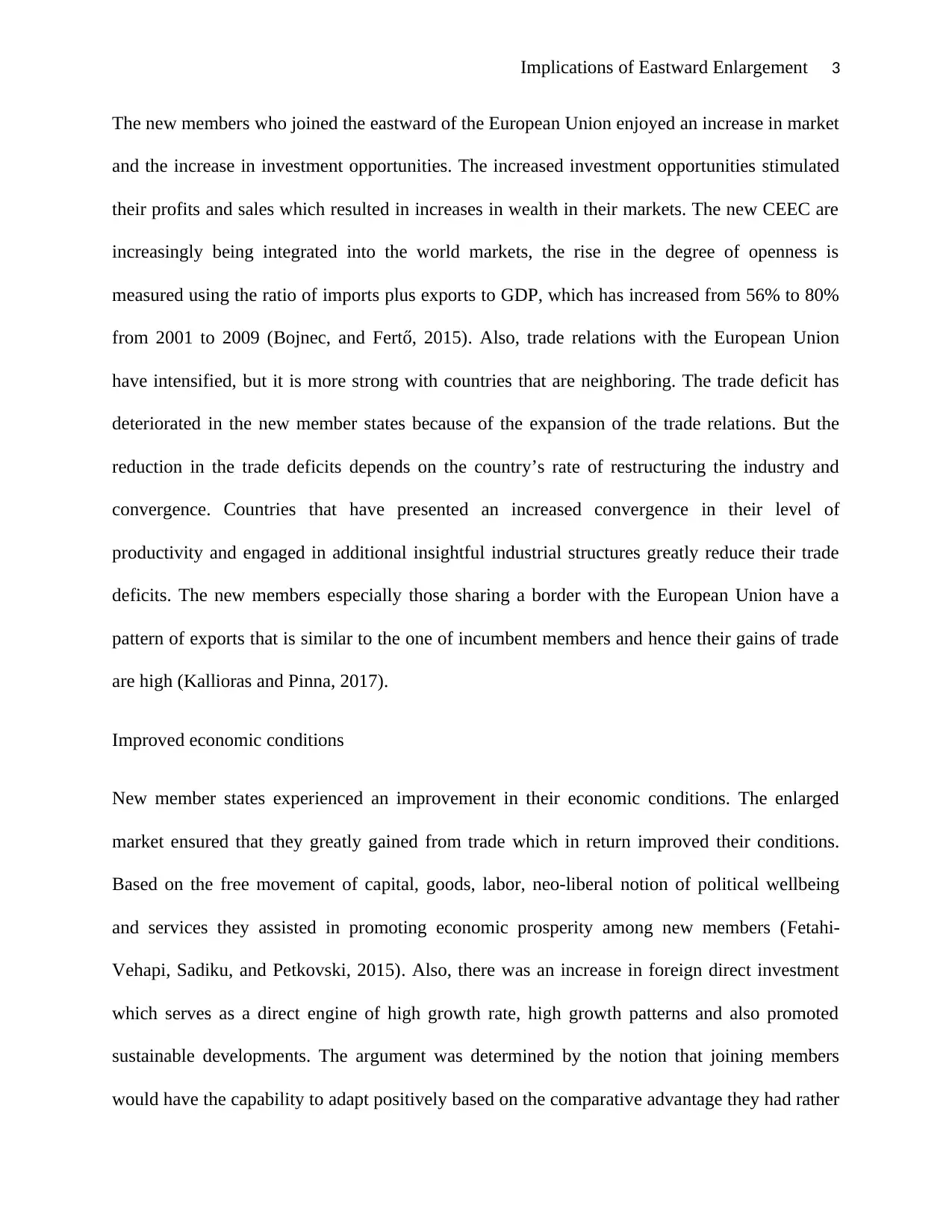
Implications of Eastward Enlargement 3
The new members who joined the eastward of the European Union enjoyed an increase in market
and the increase in investment opportunities. The increased investment opportunities stimulated
their profits and sales which resulted in increases in wealth in their markets. The new CEEC are
increasingly being integrated into the world markets, the rise in the degree of openness is
measured using the ratio of imports plus exports to GDP, which has increased from 56% to 80%
from 2001 to 2009 (Bojnec, and Fertő, 2015). Also, trade relations with the European Union
have intensified, but it is more strong with countries that are neighboring. The trade deficit has
deteriorated in the new member states because of the expansion of the trade relations. But the
reduction in the trade deficits depends on the country’s rate of restructuring the industry and
convergence. Countries that have presented an increased convergence in their level of
productivity and engaged in additional insightful industrial structures greatly reduce their trade
deficits. The new members especially those sharing a border with the European Union have a
pattern of exports that is similar to the one of incumbent members and hence their gains of trade
are high (Kallioras and Pinna, 2017).
Improved economic conditions
New member states experienced an improvement in their economic conditions. The enlarged
market ensured that they greatly gained from trade which in return improved their conditions.
Based on the free movement of capital, goods, labor, neo-liberal notion of political wellbeing
and services they assisted in promoting economic prosperity among new members (Fetahi-
Vehapi, Sadiku, and Petkovski, 2015). Also, there was an increase in foreign direct investment
which serves as a direct engine of high growth rate, high growth patterns and also promoted
sustainable developments. The argument was determined by the notion that joining members
would have the capability to adapt positively based on the comparative advantage they had rather
The new members who joined the eastward of the European Union enjoyed an increase in market
and the increase in investment opportunities. The increased investment opportunities stimulated
their profits and sales which resulted in increases in wealth in their markets. The new CEEC are
increasingly being integrated into the world markets, the rise in the degree of openness is
measured using the ratio of imports plus exports to GDP, which has increased from 56% to 80%
from 2001 to 2009 (Bojnec, and Fertő, 2015). Also, trade relations with the European Union
have intensified, but it is more strong with countries that are neighboring. The trade deficit has
deteriorated in the new member states because of the expansion of the trade relations. But the
reduction in the trade deficits depends on the country’s rate of restructuring the industry and
convergence. Countries that have presented an increased convergence in their level of
productivity and engaged in additional insightful industrial structures greatly reduce their trade
deficits. The new members especially those sharing a border with the European Union have a
pattern of exports that is similar to the one of incumbent members and hence their gains of trade
are high (Kallioras and Pinna, 2017).
Improved economic conditions
New member states experienced an improvement in their economic conditions. The enlarged
market ensured that they greatly gained from trade which in return improved their conditions.
Based on the free movement of capital, goods, labor, neo-liberal notion of political wellbeing
and services they assisted in promoting economic prosperity among new members (Fetahi-
Vehapi, Sadiku, and Petkovski, 2015). Also, there was an increase in foreign direct investment
which serves as a direct engine of high growth rate, high growth patterns and also promoted
sustainable developments. The argument was determined by the notion that joining members
would have the capability to adapt positively based on the comparative advantage they had rather
⊘ This is a preview!⊘
Do you want full access?
Subscribe today to unlock all pages.

Trusted by 1+ million students worldwide
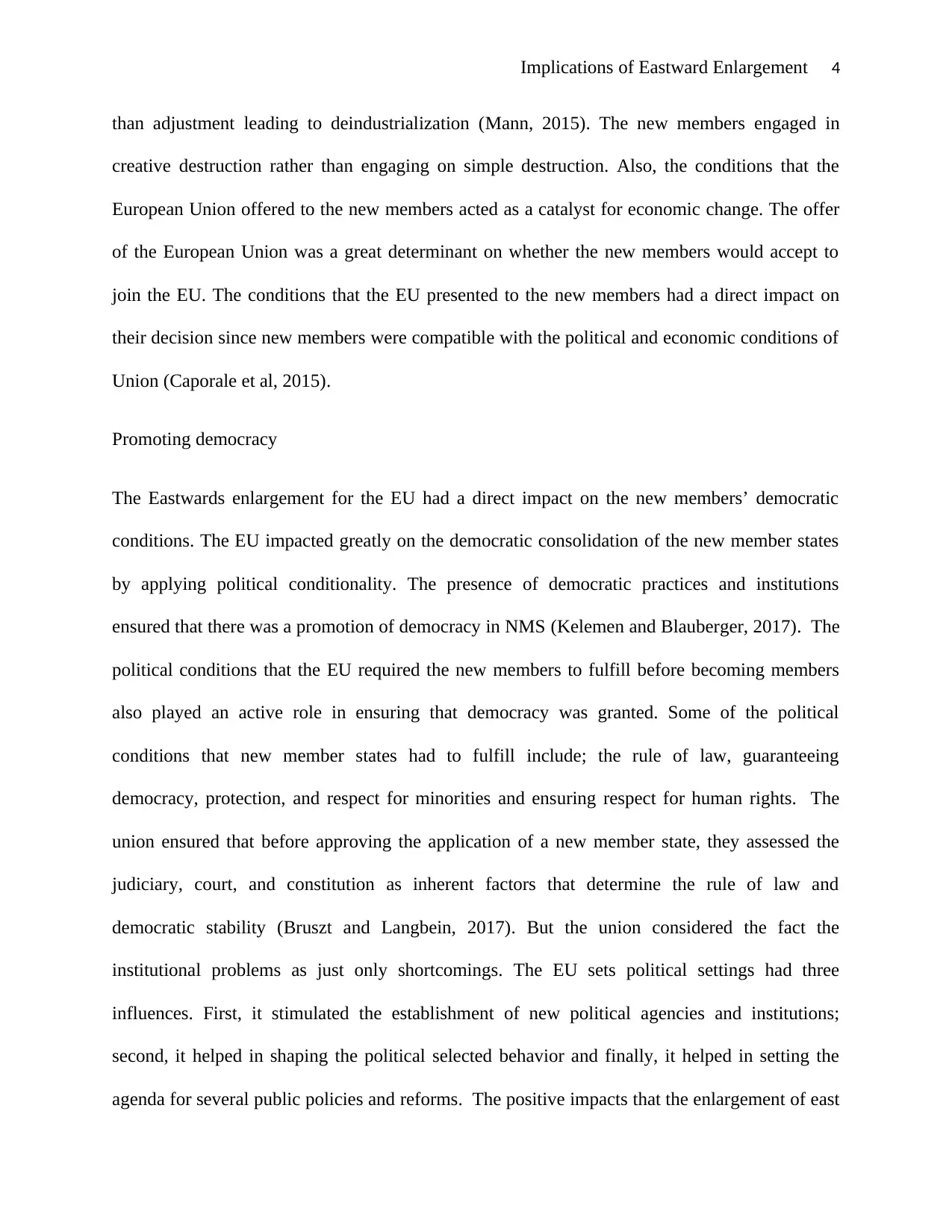
Implications of Eastward Enlargement 4
than adjustment leading to deindustrialization (Mann, 2015). The new members engaged in
creative destruction rather than engaging on simple destruction. Also, the conditions that the
European Union offered to the new members acted as a catalyst for economic change. The offer
of the European Union was a great determinant on whether the new members would accept to
join the EU. The conditions that the EU presented to the new members had a direct impact on
their decision since new members were compatible with the political and economic conditions of
Union (Caporale et al, 2015).
Promoting democracy
The Eastwards enlargement for the EU had a direct impact on the new members’ democratic
conditions. The EU impacted greatly on the democratic consolidation of the new member states
by applying political conditionality. The presence of democratic practices and institutions
ensured that there was a promotion of democracy in NMS (Kelemen and Blauberger, 2017). The
political conditions that the EU required the new members to fulfill before becoming members
also played an active role in ensuring that democracy was granted. Some of the political
conditions that new member states had to fulfill include; the rule of law, guaranteeing
democracy, protection, and respect for minorities and ensuring respect for human rights. The
union ensured that before approving the application of a new member state, they assessed the
judiciary, court, and constitution as inherent factors that determine the rule of law and
democratic stability (Bruszt and Langbein, 2017). But the union considered the fact the
institutional problems as just only shortcomings. The EU sets political settings had three
influences. First, it stimulated the establishment of new political agencies and institutions;
second, it helped in shaping the political selected behavior and finally, it helped in setting the
agenda for several public policies and reforms. The positive impacts that the enlargement of east
than adjustment leading to deindustrialization (Mann, 2015). The new members engaged in
creative destruction rather than engaging on simple destruction. Also, the conditions that the
European Union offered to the new members acted as a catalyst for economic change. The offer
of the European Union was a great determinant on whether the new members would accept to
join the EU. The conditions that the EU presented to the new members had a direct impact on
their decision since new members were compatible with the political and economic conditions of
Union (Caporale et al, 2015).
Promoting democracy
The Eastwards enlargement for the EU had a direct impact on the new members’ democratic
conditions. The EU impacted greatly on the democratic consolidation of the new member states
by applying political conditionality. The presence of democratic practices and institutions
ensured that there was a promotion of democracy in NMS (Kelemen and Blauberger, 2017). The
political conditions that the EU required the new members to fulfill before becoming members
also played an active role in ensuring that democracy was granted. Some of the political
conditions that new member states had to fulfill include; the rule of law, guaranteeing
democracy, protection, and respect for minorities and ensuring respect for human rights. The
union ensured that before approving the application of a new member state, they assessed the
judiciary, court, and constitution as inherent factors that determine the rule of law and
democratic stability (Bruszt and Langbein, 2017). But the union considered the fact the
institutional problems as just only shortcomings. The EU sets political settings had three
influences. First, it stimulated the establishment of new political agencies and institutions;
second, it helped in shaping the political selected behavior and finally, it helped in setting the
agenda for several public policies and reforms. The positive impacts that the enlargement of east
Paraphrase This Document
Need a fresh take? Get an instant paraphrase of this document with our AI Paraphraser
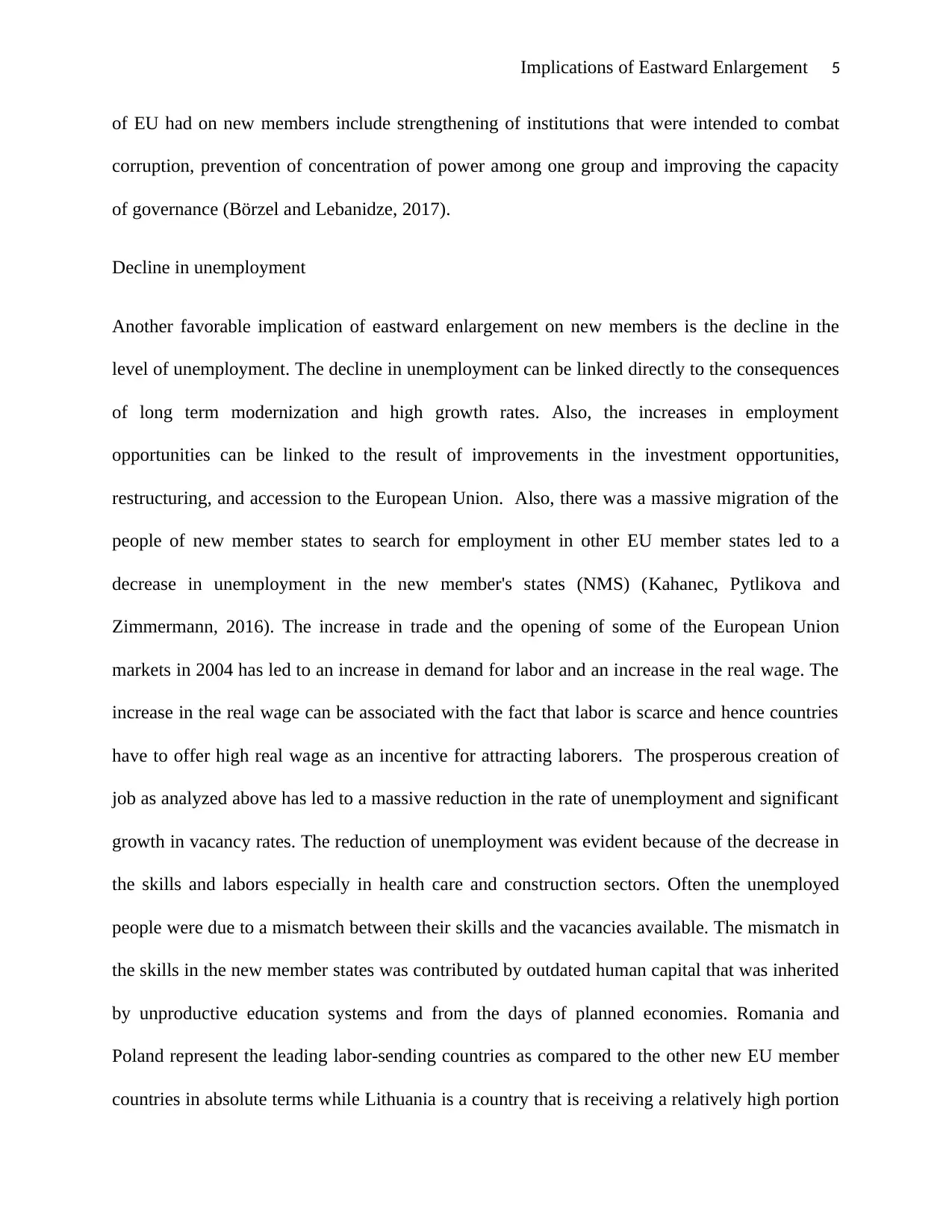
Implications of Eastward Enlargement 5
of EU had on new members include strengthening of institutions that were intended to combat
corruption, prevention of concentration of power among one group and improving the capacity
of governance (Börzel and Lebanidze, 2017).
Decline in unemployment
Another favorable implication of eastward enlargement on new members is the decline in the
level of unemployment. The decline in unemployment can be linked directly to the consequences
of long term modernization and high growth rates. Also, the increases in employment
opportunities can be linked to the result of improvements in the investment opportunities,
restructuring, and accession to the European Union. Also, there was a massive migration of the
people of new member states to search for employment in other EU member states led to a
decrease in unemployment in the new member's states (NMS) (Kahanec, Pytlikova and
Zimmermann, 2016). The increase in trade and the opening of some of the European Union
markets in 2004 has led to an increase in demand for labor and an increase in the real wage. The
increase in the real wage can be associated with the fact that labor is scarce and hence countries
have to offer high real wage as an incentive for attracting laborers. The prosperous creation of
job as analyzed above has led to a massive reduction in the rate of unemployment and significant
growth in vacancy rates. The reduction of unemployment was evident because of the decrease in
the skills and labors especially in health care and construction sectors. Often the unemployed
people were due to a mismatch between their skills and the vacancies available. The mismatch in
the skills in the new member states was contributed by outdated human capital that was inherited
by unproductive education systems and from the days of planned economies. Romania and
Poland represent the leading labor-sending countries as compared to the other new EU member
countries in absolute terms while Lithuania is a country that is receiving a relatively high portion
of EU had on new members include strengthening of institutions that were intended to combat
corruption, prevention of concentration of power among one group and improving the capacity
of governance (Börzel and Lebanidze, 2017).
Decline in unemployment
Another favorable implication of eastward enlargement on new members is the decline in the
level of unemployment. The decline in unemployment can be linked directly to the consequences
of long term modernization and high growth rates. Also, the increases in employment
opportunities can be linked to the result of improvements in the investment opportunities,
restructuring, and accession to the European Union. Also, there was a massive migration of the
people of new member states to search for employment in other EU member states led to a
decrease in unemployment in the new member's states (NMS) (Kahanec, Pytlikova and
Zimmermann, 2016). The increase in trade and the opening of some of the European Union
markets in 2004 has led to an increase in demand for labor and an increase in the real wage. The
increase in the real wage can be associated with the fact that labor is scarce and hence countries
have to offer high real wage as an incentive for attracting laborers. The prosperous creation of
job as analyzed above has led to a massive reduction in the rate of unemployment and significant
growth in vacancy rates. The reduction of unemployment was evident because of the decrease in
the skills and labors especially in health care and construction sectors. Often the unemployed
people were due to a mismatch between their skills and the vacancies available. The mismatch in
the skills in the new member states was contributed by outdated human capital that was inherited
by unproductive education systems and from the days of planned economies. Romania and
Poland represent the leading labor-sending countries as compared to the other new EU member
countries in absolute terms while Lithuania is a country that is receiving a relatively high portion
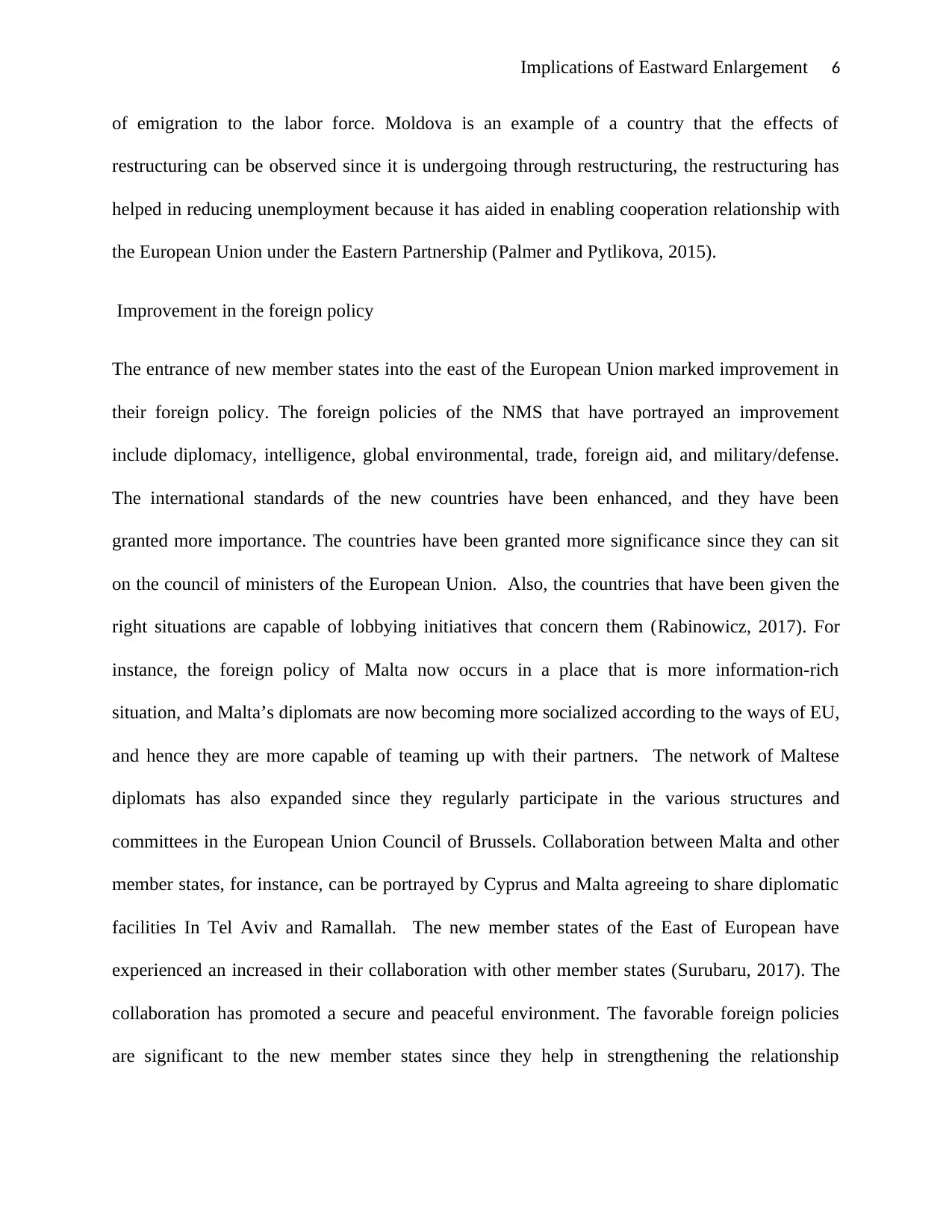
Implications of Eastward Enlargement 6
of emigration to the labor force. Moldova is an example of a country that the effects of
restructuring can be observed since it is undergoing through restructuring, the restructuring has
helped in reducing unemployment because it has aided in enabling cooperation relationship with
the European Union under the Eastern Partnership (Palmer and Pytlikova, 2015).
Improvement in the foreign policy
The entrance of new member states into the east of the European Union marked improvement in
their foreign policy. The foreign policies of the NMS that have portrayed an improvement
include diplomacy, intelligence, global environmental, trade, foreign aid, and military/defense.
The international standards of the new countries have been enhanced, and they have been
granted more importance. The countries have been granted more significance since they can sit
on the council of ministers of the European Union. Also, the countries that have been given the
right situations are capable of lobbying initiatives that concern them (Rabinowicz, 2017). For
instance, the foreign policy of Malta now occurs in a place that is more information-rich
situation, and Malta’s diplomats are now becoming more socialized according to the ways of EU,
and hence they are more capable of teaming up with their partners. The network of Maltese
diplomats has also expanded since they regularly participate in the various structures and
committees in the European Union Council of Brussels. Collaboration between Malta and other
member states, for instance, can be portrayed by Cyprus and Malta agreeing to share diplomatic
facilities In Tel Aviv and Ramallah. The new member states of the East of European have
experienced an increased in their collaboration with other member states (Surubaru, 2017). The
collaboration has promoted a secure and peaceful environment. The favorable foreign policies
are significant to the new member states since they help in strengthening the relationship
of emigration to the labor force. Moldova is an example of a country that the effects of
restructuring can be observed since it is undergoing through restructuring, the restructuring has
helped in reducing unemployment because it has aided in enabling cooperation relationship with
the European Union under the Eastern Partnership (Palmer and Pytlikova, 2015).
Improvement in the foreign policy
The entrance of new member states into the east of the European Union marked improvement in
their foreign policy. The foreign policies of the NMS that have portrayed an improvement
include diplomacy, intelligence, global environmental, trade, foreign aid, and military/defense.
The international standards of the new countries have been enhanced, and they have been
granted more importance. The countries have been granted more significance since they can sit
on the council of ministers of the European Union. Also, the countries that have been given the
right situations are capable of lobbying initiatives that concern them (Rabinowicz, 2017). For
instance, the foreign policy of Malta now occurs in a place that is more information-rich
situation, and Malta’s diplomats are now becoming more socialized according to the ways of EU,
and hence they are more capable of teaming up with their partners. The network of Maltese
diplomats has also expanded since they regularly participate in the various structures and
committees in the European Union Council of Brussels. Collaboration between Malta and other
member states, for instance, can be portrayed by Cyprus and Malta agreeing to share diplomatic
facilities In Tel Aviv and Ramallah. The new member states of the East of European have
experienced an increased in their collaboration with other member states (Surubaru, 2017). The
collaboration has promoted a secure and peaceful environment. The favorable foreign policies
are significant to the new member states since they help in strengthening the relationship
⊘ This is a preview!⊘
Do you want full access?
Subscribe today to unlock all pages.

Trusted by 1+ million students worldwide
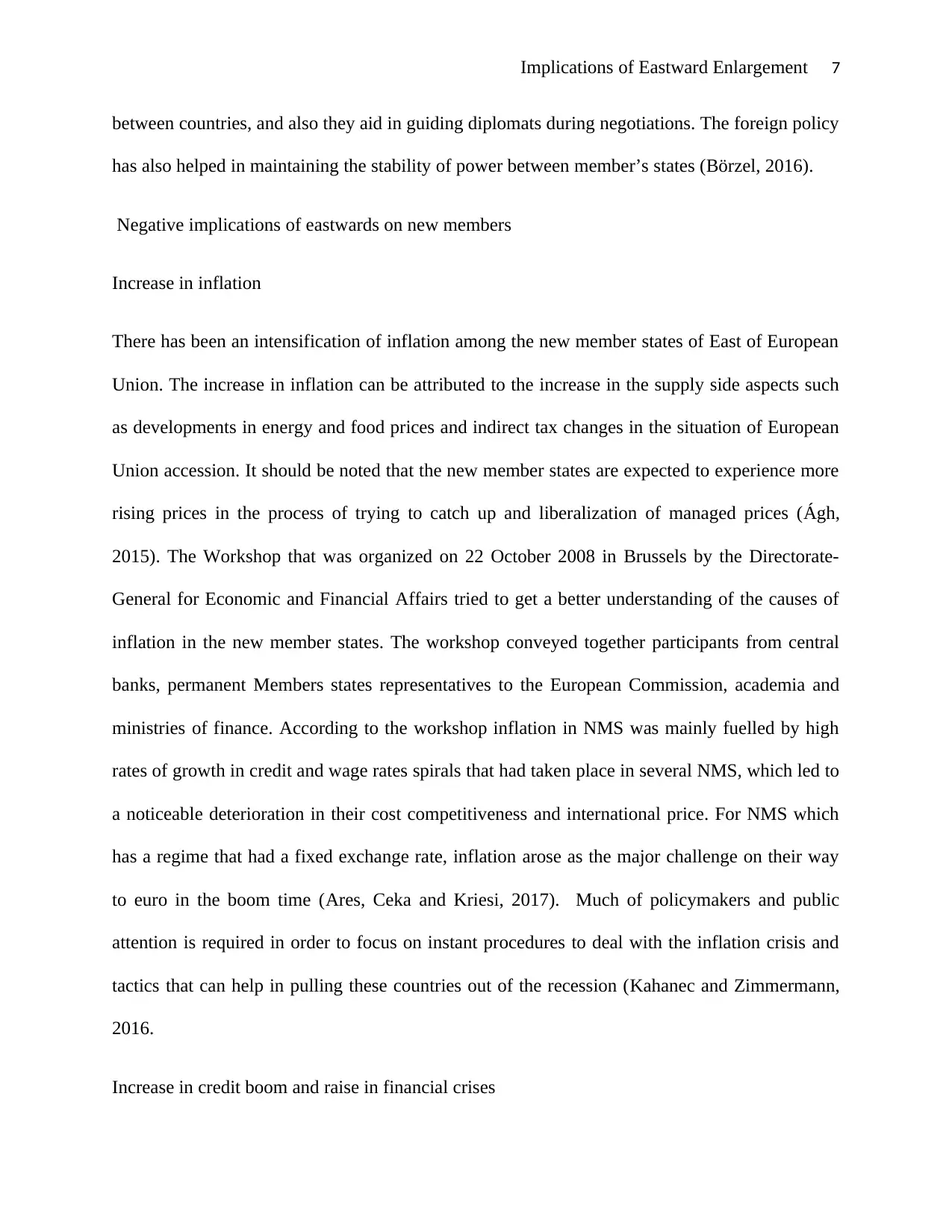
Implications of Eastward Enlargement 7
between countries, and also they aid in guiding diplomats during negotiations. The foreign policy
has also helped in maintaining the stability of power between member’s states (Börzel, 2016).
Negative implications of eastwards on new members
Increase in inflation
There has been an intensification of inflation among the new member states of East of European
Union. The increase in inflation can be attributed to the increase in the supply side aspects such
as developments in energy and food prices and indirect tax changes in the situation of European
Union accession. It should be noted that the new member states are expected to experience more
rising prices in the process of trying to catch up and liberalization of managed prices (Ágh,
2015). The Workshop that was organized on 22 October 2008 in Brussels by the Directorate-
General for Economic and Financial Affairs tried to get a better understanding of the causes of
inflation in the new member states. The workshop conveyed together participants from central
banks, permanent Members states representatives to the European Commission, academia and
ministries of finance. According to the workshop inflation in NMS was mainly fuelled by high
rates of growth in credit and wage rates spirals that had taken place in several NMS, which led to
a noticeable deterioration in their cost competitiveness and international price. For NMS which
has a regime that had a fixed exchange rate, inflation arose as the major challenge on their way
to euro in the boom time (Ares, Ceka and Kriesi, 2017). Much of policymakers and public
attention is required in order to focus on instant procedures to deal with the inflation crisis and
tactics that can help in pulling these countries out of the recession (Kahanec and Zimmermann,
2016.
Increase in credit boom and raise in financial crises
between countries, and also they aid in guiding diplomats during negotiations. The foreign policy
has also helped in maintaining the stability of power between member’s states (Börzel, 2016).
Negative implications of eastwards on new members
Increase in inflation
There has been an intensification of inflation among the new member states of East of European
Union. The increase in inflation can be attributed to the increase in the supply side aspects such
as developments in energy and food prices and indirect tax changes in the situation of European
Union accession. It should be noted that the new member states are expected to experience more
rising prices in the process of trying to catch up and liberalization of managed prices (Ágh,
2015). The Workshop that was organized on 22 October 2008 in Brussels by the Directorate-
General for Economic and Financial Affairs tried to get a better understanding of the causes of
inflation in the new member states. The workshop conveyed together participants from central
banks, permanent Members states representatives to the European Commission, academia and
ministries of finance. According to the workshop inflation in NMS was mainly fuelled by high
rates of growth in credit and wage rates spirals that had taken place in several NMS, which led to
a noticeable deterioration in their cost competitiveness and international price. For NMS which
has a regime that had a fixed exchange rate, inflation arose as the major challenge on their way
to euro in the boom time (Ares, Ceka and Kriesi, 2017). Much of policymakers and public
attention is required in order to focus on instant procedures to deal with the inflation crisis and
tactics that can help in pulling these countries out of the recession (Kahanec and Zimmermann,
2016.
Increase in credit boom and raise in financial crises
Paraphrase This Document
Need a fresh take? Get an instant paraphrase of this document with our AI Paraphraser
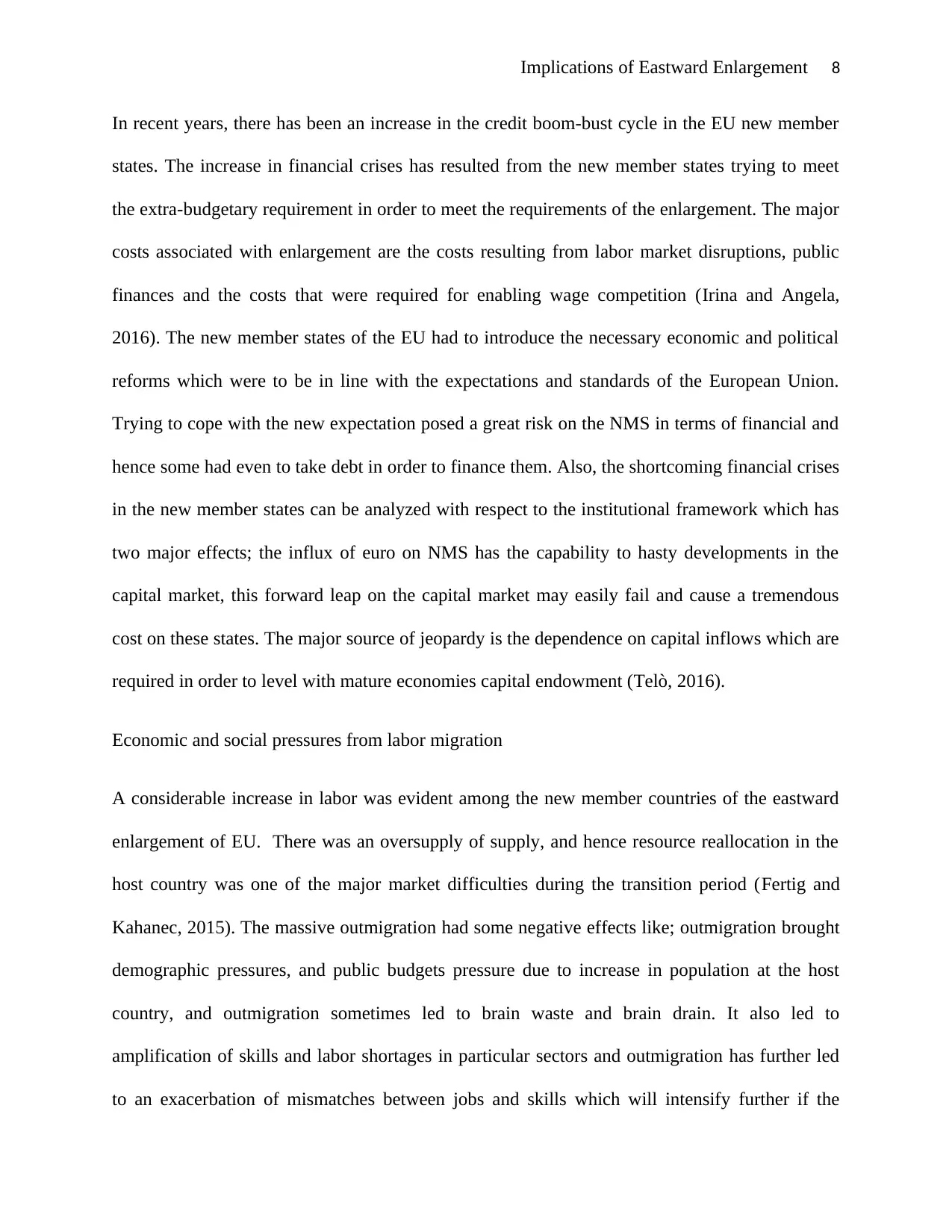
Implications of Eastward Enlargement 8
In recent years, there has been an increase in the credit boom-bust cycle in the EU new member
states. The increase in financial crises has resulted from the new member states trying to meet
the extra-budgetary requirement in order to meet the requirements of the enlargement. The major
costs associated with enlargement are the costs resulting from labor market disruptions, public
finances and the costs that were required for enabling wage competition (Irina and Angela,
2016). The new member states of the EU had to introduce the necessary economic and political
reforms which were to be in line with the expectations and standards of the European Union.
Trying to cope with the new expectation posed a great risk on the NMS in terms of financial and
hence some had even to take debt in order to finance them. Also, the shortcoming financial crises
in the new member states can be analyzed with respect to the institutional framework which has
two major effects; the influx of euro on NMS has the capability to hasty developments in the
capital market, this forward leap on the capital market may easily fail and cause a tremendous
cost on these states. The major source of jeopardy is the dependence on capital inflows which are
required in order to level with mature economies capital endowment (Telò, 2016).
Economic and social pressures from labor migration
A considerable increase in labor was evident among the new member countries of the eastward
enlargement of EU. There was an oversupply of supply, and hence resource reallocation in the
host country was one of the major market difficulties during the transition period (Fertig and
Kahanec, 2015). The massive outmigration had some negative effects like; outmigration brought
demographic pressures, and public budgets pressure due to increase in population at the host
country, and outmigration sometimes led to brain waste and brain drain. It also led to
amplification of skills and labor shortages in particular sectors and outmigration has further led
to an exacerbation of mismatches between jobs and skills which will intensify further if the
In recent years, there has been an increase in the credit boom-bust cycle in the EU new member
states. The increase in financial crises has resulted from the new member states trying to meet
the extra-budgetary requirement in order to meet the requirements of the enlargement. The major
costs associated with enlargement are the costs resulting from labor market disruptions, public
finances and the costs that were required for enabling wage competition (Irina and Angela,
2016). The new member states of the EU had to introduce the necessary economic and political
reforms which were to be in line with the expectations and standards of the European Union.
Trying to cope with the new expectation posed a great risk on the NMS in terms of financial and
hence some had even to take debt in order to finance them. Also, the shortcoming financial crises
in the new member states can be analyzed with respect to the institutional framework which has
two major effects; the influx of euro on NMS has the capability to hasty developments in the
capital market, this forward leap on the capital market may easily fail and cause a tremendous
cost on these states. The major source of jeopardy is the dependence on capital inflows which are
required in order to level with mature economies capital endowment (Telò, 2016).
Economic and social pressures from labor migration
A considerable increase in labor was evident among the new member countries of the eastward
enlargement of EU. There was an oversupply of supply, and hence resource reallocation in the
host country was one of the major market difficulties during the transition period (Fertig and
Kahanec, 2015). The massive outmigration had some negative effects like; outmigration brought
demographic pressures, and public budgets pressure due to increase in population at the host
country, and outmigration sometimes led to brain waste and brain drain. It also led to
amplification of skills and labor shortages in particular sectors and outmigration has further led
to an exacerbation of mismatches between jobs and skills which will intensify further if the
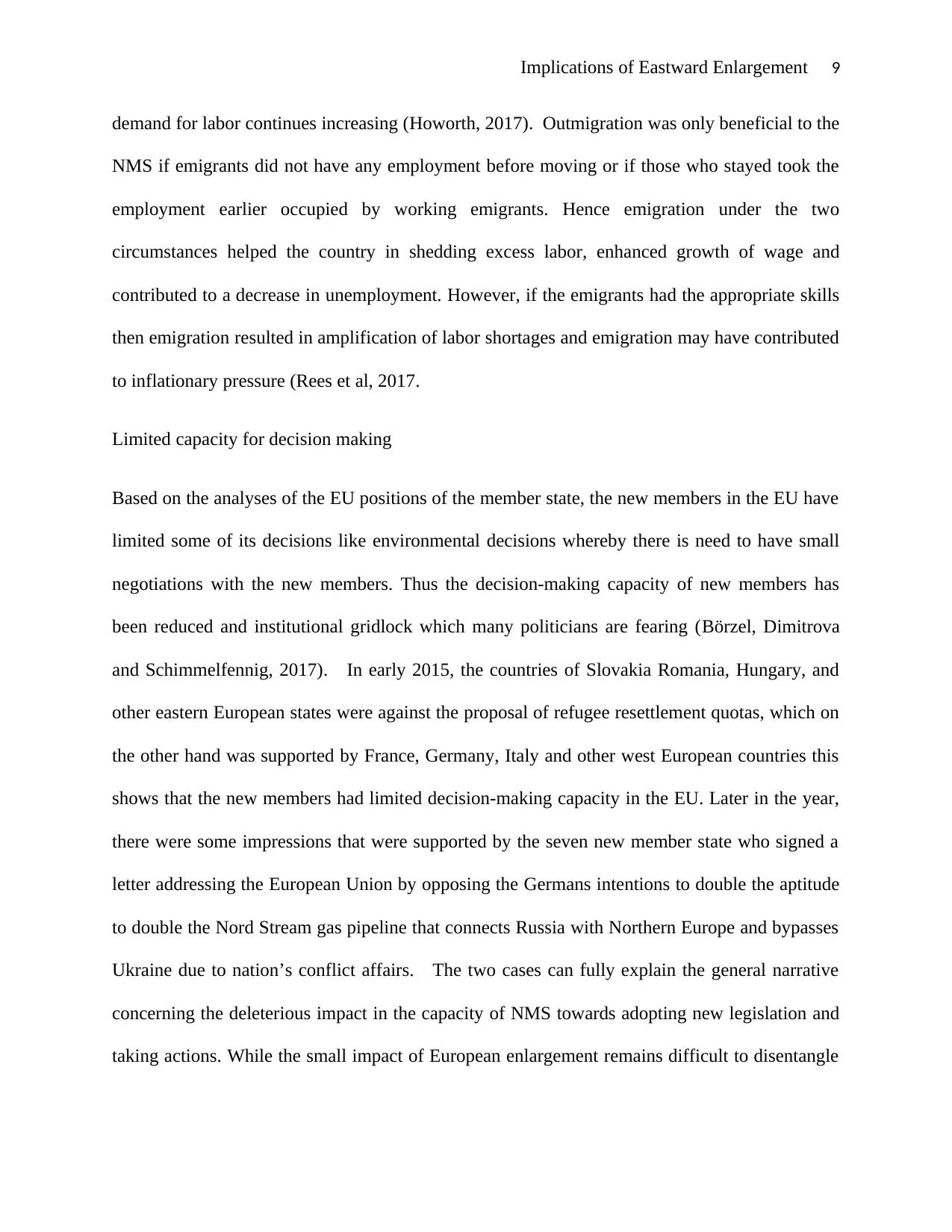
Implications of Eastward Enlargement 9
demand for labor continues increasing (Howorth, 2017). Outmigration was only beneficial to the
NMS if emigrants did not have any employment before moving or if those who stayed took the
employment earlier occupied by working emigrants. Hence emigration under the two
circumstances helped the country in shedding excess labor, enhanced growth of wage and
contributed to a decrease in unemployment. However, if the emigrants had the appropriate skills
then emigration resulted in amplification of labor shortages and emigration may have contributed
to inflationary pressure (Rees et al, 2017.
Limited capacity for decision making
Based on the analyses of the EU positions of the member state, the new members in the EU have
limited some of its decisions like environmental decisions whereby there is need to have small
negotiations with the new members. Thus the decision-making capacity of new members has
been reduced and institutional gridlock which many politicians are fearing (Börzel, Dimitrova
and Schimmelfennig, 2017). In early 2015, the countries of Slovakia Romania, Hungary, and
other eastern European states were against the proposal of refugee resettlement quotas, which on
the other hand was supported by France, Germany, Italy and other west European countries this
shows that the new members had limited decision-making capacity in the EU. Later in the year,
there were some impressions that were supported by the seven new member state who signed a
letter addressing the European Union by opposing the Germans intentions to double the aptitude
to double the Nord Stream gas pipeline that connects Russia with Northern Europe and bypasses
Ukraine due to nation’s conflict affairs. The two cases can fully explain the general narrative
concerning the deleterious impact in the capacity of NMS towards adopting new legislation and
taking actions. While the small impact of European enlargement remains difficult to disentangle
demand for labor continues increasing (Howorth, 2017). Outmigration was only beneficial to the
NMS if emigrants did not have any employment before moving or if those who stayed took the
employment earlier occupied by working emigrants. Hence emigration under the two
circumstances helped the country in shedding excess labor, enhanced growth of wage and
contributed to a decrease in unemployment. However, if the emigrants had the appropriate skills
then emigration resulted in amplification of labor shortages and emigration may have contributed
to inflationary pressure (Rees et al, 2017.
Limited capacity for decision making
Based on the analyses of the EU positions of the member state, the new members in the EU have
limited some of its decisions like environmental decisions whereby there is need to have small
negotiations with the new members. Thus the decision-making capacity of new members has
been reduced and institutional gridlock which many politicians are fearing (Börzel, Dimitrova
and Schimmelfennig, 2017). In early 2015, the countries of Slovakia Romania, Hungary, and
other eastern European states were against the proposal of refugee resettlement quotas, which on
the other hand was supported by France, Germany, Italy and other west European countries this
shows that the new members had limited decision-making capacity in the EU. Later in the year,
there were some impressions that were supported by the seven new member state who signed a
letter addressing the European Union by opposing the Germans intentions to double the aptitude
to double the Nord Stream gas pipeline that connects Russia with Northern Europe and bypasses
Ukraine due to nation’s conflict affairs. The two cases can fully explain the general narrative
concerning the deleterious impact in the capacity of NMS towards adopting new legislation and
taking actions. While the small impact of European enlargement remains difficult to disentangle
⊘ This is a preview!⊘
Do you want full access?
Subscribe today to unlock all pages.

Trusted by 1+ million students worldwide
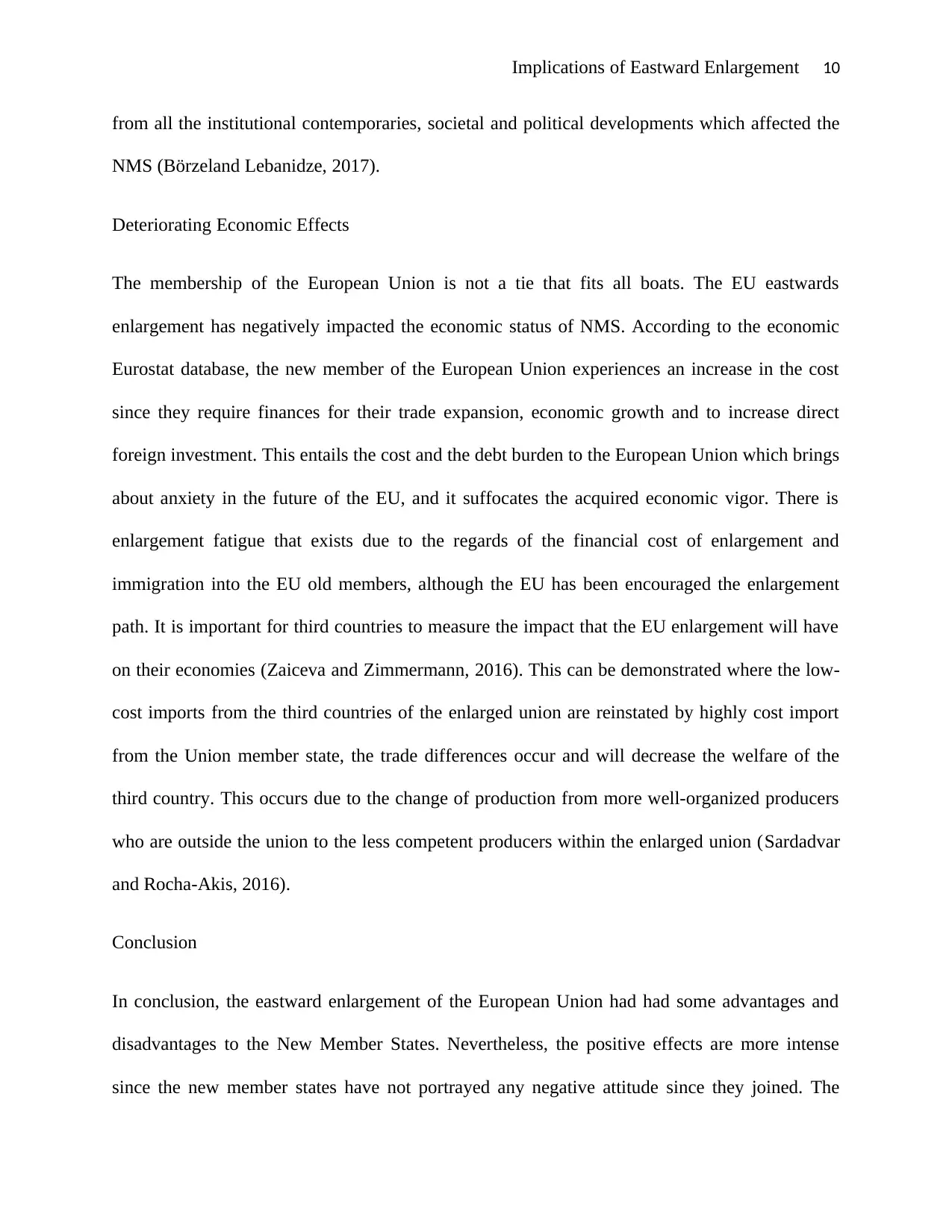
Implications of Eastward Enlargement 10
from all the institutional contemporaries, societal and political developments which affected the
NMS (Börzeland Lebanidze, 2017).
Deteriorating Economic Effects
The membership of the European Union is not a tie that fits all boats. The EU eastwards
enlargement has negatively impacted the economic status of NMS. According to the economic
Eurostat database, the new member of the European Union experiences an increase in the cost
since they require finances for their trade expansion, economic growth and to increase direct
foreign investment. This entails the cost and the debt burden to the European Union which brings
about anxiety in the future of the EU, and it suffocates the acquired economic vigor. There is
enlargement fatigue that exists due to the regards of the financial cost of enlargement and
immigration into the EU old members, although the EU has been encouraged the enlargement
path. It is important for third countries to measure the impact that the EU enlargement will have
on their economies (Zaiceva and Zimmermann, 2016). This can be demonstrated where the low-
cost imports from the third countries of the enlarged union are reinstated by highly cost import
from the Union member state, the trade differences occur and will decrease the welfare of the
third country. This occurs due to the change of production from more well-organized producers
who are outside the union to the less competent producers within the enlarged union (Sardadvar
and Rocha-Akis, 2016).
Conclusion
In conclusion, the eastward enlargement of the European Union had had some advantages and
disadvantages to the New Member States. Nevertheless, the positive effects are more intense
since the new member states have not portrayed any negative attitude since they joined. The
from all the institutional contemporaries, societal and political developments which affected the
NMS (Börzeland Lebanidze, 2017).
Deteriorating Economic Effects
The membership of the European Union is not a tie that fits all boats. The EU eastwards
enlargement has negatively impacted the economic status of NMS. According to the economic
Eurostat database, the new member of the European Union experiences an increase in the cost
since they require finances for their trade expansion, economic growth and to increase direct
foreign investment. This entails the cost and the debt burden to the European Union which brings
about anxiety in the future of the EU, and it suffocates the acquired economic vigor. There is
enlargement fatigue that exists due to the regards of the financial cost of enlargement and
immigration into the EU old members, although the EU has been encouraged the enlargement
path. It is important for third countries to measure the impact that the EU enlargement will have
on their economies (Zaiceva and Zimmermann, 2016). This can be demonstrated where the low-
cost imports from the third countries of the enlarged union are reinstated by highly cost import
from the Union member state, the trade differences occur and will decrease the welfare of the
third country. This occurs due to the change of production from more well-organized producers
who are outside the union to the less competent producers within the enlarged union (Sardadvar
and Rocha-Akis, 2016).
Conclusion
In conclusion, the eastward enlargement of the European Union had had some advantages and
disadvantages to the New Member States. Nevertheless, the positive effects are more intense
since the new member states have not portrayed any negative attitude since they joined. The
Paraphrase This Document
Need a fresh take? Get an instant paraphrase of this document with our AI Paraphraser

Implications of Eastward Enlargement 11
positive effects of eastward enlargement like the growth of the economy are an improvement in
trade are so beneficial to them such that they outweigh the associated risks. The risks associated
with joining the East of EU on NMS can be rectified, and hence they should adopt necessary
tactics in order to ensure that they cope effectively with the risks.
positive effects of eastward enlargement like the growth of the economy are an improvement in
trade are so beneficial to them such that they outweigh the associated risks. The risks associated
with joining the East of EU on NMS can be rectified, and hence they should adopt necessary
tactics in order to ensure that they cope effectively with the risks.
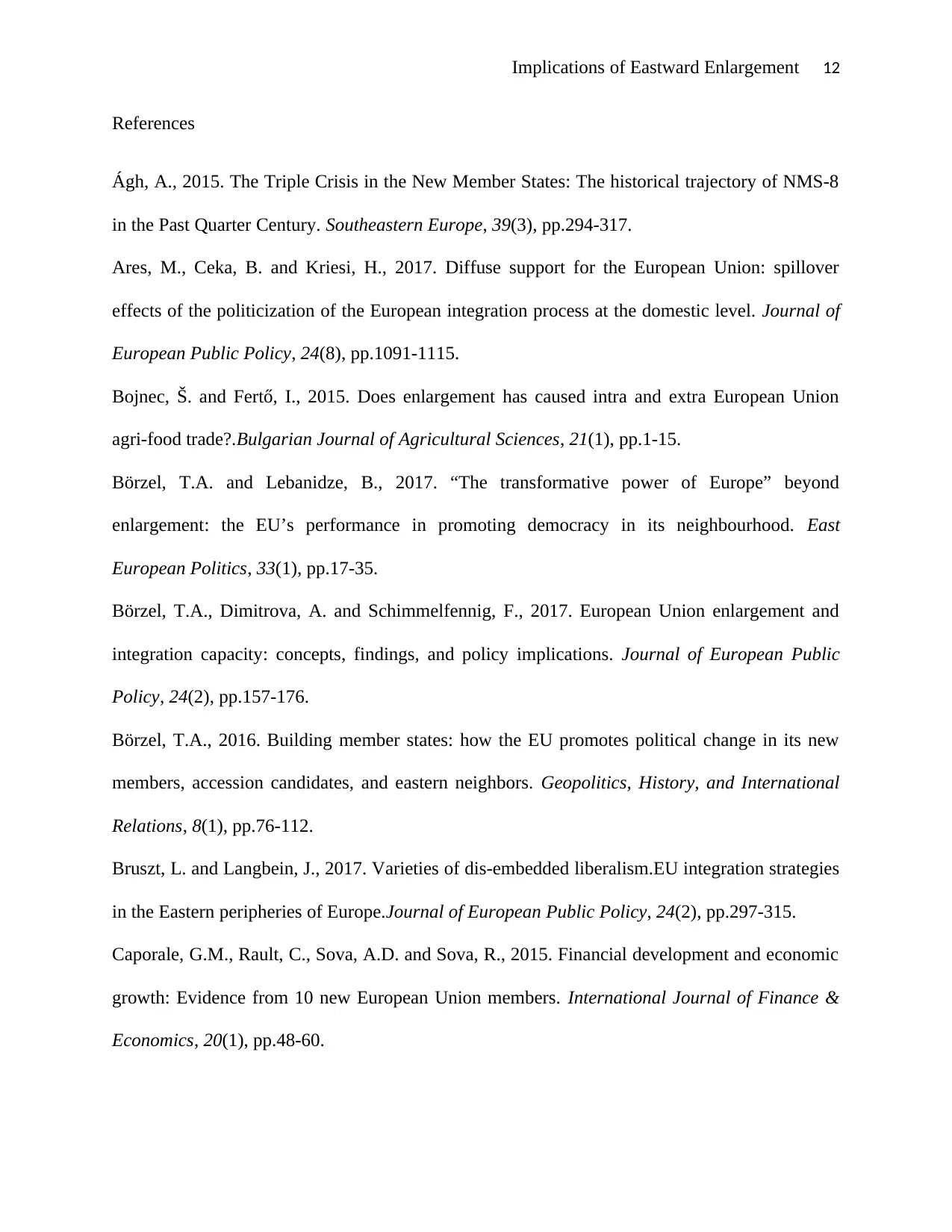
Implications of Eastward Enlargement 12
References
Ágh, A., 2015. The Triple Crisis in the New Member States: The historical trajectory of NMS-8
in the Past Quarter Century. Southeastern Europe, 39(3), pp.294-317.
Ares, M., Ceka, B. and Kriesi, H., 2017. Diffuse support for the European Union: spillover
effects of the politicization of the European integration process at the domestic level. Journal of
European Public Policy, 24(8), pp.1091-1115.
Bojnec, Š. and Fertő, I., 2015. Does enlargement has caused intra and extra European Union
agri-food trade?.Bulgarian Journal of Agricultural Sciences, 21(1), pp.1-15.
Börzel, T.A. and Lebanidze, B., 2017. “The transformative power of Europe” beyond
enlargement: the EU’s performance in promoting democracy in its neighbourhood. East
European Politics, 33(1), pp.17-35.
Börzel, T.A., Dimitrova, A. and Schimmelfennig, F., 2017. European Union enlargement and
integration capacity: concepts, findings, and policy implications. Journal of European Public
Policy, 24(2), pp.157-176.
Börzel, T.A., 2016. Building member states: how the EU promotes political change in its new
members, accession candidates, and eastern neighbors. Geopolitics, History, and International
Relations, 8(1), pp.76-112.
Bruszt, L. and Langbein, J., 2017. Varieties of dis-embedded liberalism.EU integration strategies
in the Eastern peripheries of Europe.Journal of European Public Policy, 24(2), pp.297-315.
Caporale, G.M., Rault, C., Sova, A.D. and Sova, R., 2015. Financial development and economic
growth: Evidence from 10 new European Union members. International Journal of Finance &
Economics, 20(1), pp.48-60.
References
Ágh, A., 2015. The Triple Crisis in the New Member States: The historical trajectory of NMS-8
in the Past Quarter Century. Southeastern Europe, 39(3), pp.294-317.
Ares, M., Ceka, B. and Kriesi, H., 2017. Diffuse support for the European Union: spillover
effects of the politicization of the European integration process at the domestic level. Journal of
European Public Policy, 24(8), pp.1091-1115.
Bojnec, Š. and Fertő, I., 2015. Does enlargement has caused intra and extra European Union
agri-food trade?.Bulgarian Journal of Agricultural Sciences, 21(1), pp.1-15.
Börzel, T.A. and Lebanidze, B., 2017. “The transformative power of Europe” beyond
enlargement: the EU’s performance in promoting democracy in its neighbourhood. East
European Politics, 33(1), pp.17-35.
Börzel, T.A., Dimitrova, A. and Schimmelfennig, F., 2017. European Union enlargement and
integration capacity: concepts, findings, and policy implications. Journal of European Public
Policy, 24(2), pp.157-176.
Börzel, T.A., 2016. Building member states: how the EU promotes political change in its new
members, accession candidates, and eastern neighbors. Geopolitics, History, and International
Relations, 8(1), pp.76-112.
Bruszt, L. and Langbein, J., 2017. Varieties of dis-embedded liberalism.EU integration strategies
in the Eastern peripheries of Europe.Journal of European Public Policy, 24(2), pp.297-315.
Caporale, G.M., Rault, C., Sova, A.D. and Sova, R., 2015. Financial development and economic
growth: Evidence from 10 new European Union members. International Journal of Finance &
Economics, 20(1), pp.48-60.
⊘ This is a preview!⊘
Do you want full access?
Subscribe today to unlock all pages.

Trusted by 1+ million students worldwide
1 out of 14
Related Documents
Your All-in-One AI-Powered Toolkit for Academic Success.
+13062052269
info@desklib.com
Available 24*7 on WhatsApp / Email
![[object Object]](/_next/static/media/star-bottom.7253800d.svg)
Unlock your academic potential
Copyright © 2020–2026 A2Z Services. All Rights Reserved. Developed and managed by ZUCOL.





